Rugby World Cup 2015: Inside England's physio department
- Published
'We don't fully understand concussion'
2015 Rugby World Cup |
|---|
Host: England and Wales Dates: 18 September-31 October |
Coverage: Live commentary on BBC Radio 5 live and sports extra, BBC Radio Scotland, plus live text commentary on every match on the BBC Sport website |
On Friday, England v Fiji at Twickenham will kick off six weeks of high-impact, bone-shaking Rugby World Cup action.
Alongside the dazzling tries and mazy runs will come the potential for injury, and the man who has been picking up the pieces for England since 1997 is senior physiotherapist Phil Pask.
The former Northampton Saints player, who has toured with the British and Irish Lions three times, has spoken exclusively to BBC Inside Out along with fellow team physio Dan Lewindon about life in Stuart Lancaster's team and the issues facing physio departments today.
Pask on concussion
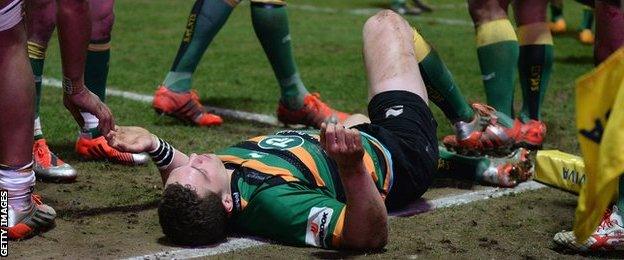
George North saw a consultant neurologist after suffering a blow to the head during Northampton's win against Wasps in March
One of the main talking points in rugby union at the moment is how to deal with concussion and its effects, an issue put into focus by Wales wing George North needing a prolonged lay-off after suffering three in five months.
The England team had to deal with full-back Mike Brown's blow to the head against Italy in the Six Nations this year, and Pask says that since turning professional concussion has been high on the sport's agenda.
"I think we don't fully understand what concussion is, but we're learning more about it all the time. We're taking advice from all over the world to understand this better and I think we're all now more vigilant to any signs that we think could be a severe or major blow to the head or head injury.
"The ones that are difficult to deal with are the ones that you don't see. I watch every contact, I'm usually watching the game from five metres behind, but I will quite often miss big hits that happen on the far side of the ruck or a maul and it's not until later in the evening when I watch the video I think 'How did I miss that?'.
"It's the subtle symptoms that we're all being a bit more aware of now."
Rushing onto a field of 30 players
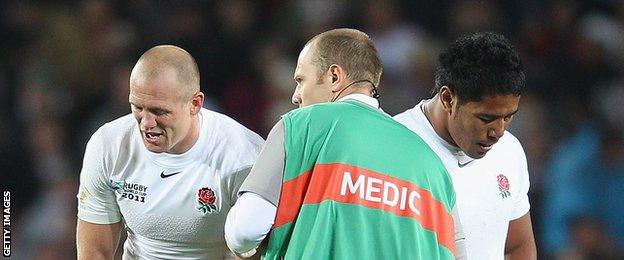
Dan Lewindon treats Mike Tindall on the field during the 2011 Rugby World Cup
Every team of medics and physiotherapists will enter the field of play to treat a player at some point, effectively having a 'patient' to deal with while surrounded by 30 burly blokes running at each other.
And Lewindon, who was previously a physiotherapist at Northampton, says the medical team's training means they know exactly what to do in these highly-charged moments.
"Because we're well rehearsed and well trained it's quite simple to go to task with these things," he said. "The first thing we do is to ensure we are safe to approach a player, that we won't get clattered.
"You go into an immediate calm state, and your whole focus is on that player's welfare. It's making sure you make the right decisions for them and communicate with the coaches properly."
Too big to be safe?
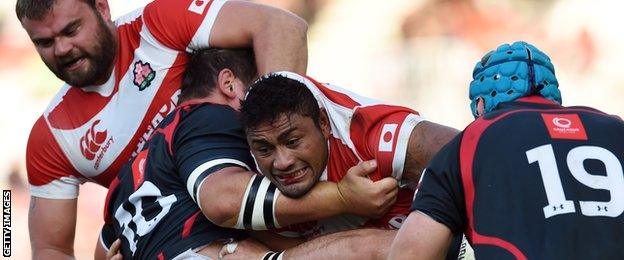
The introduction of professionalism in rugby union in 1995 means players are now bigger and stronger than in the amateur days
With an intense focus on the long-term effects of 20-stone frames bumping into each other, rugby has sometimes had to defend itself against its perceived brutality.
But Pask believes the increase in the physicality of players comes at a time of great advancements in the medical and physiotherapy world.
"The players are conditioned to what they do, so although they've got bigger, faster and stronger, so has the opposition," he explained. "It counterbalances it out.
"We do get some nasty injuries, but we're a lot more experienced dealing with them. Back in the day if you were amateur and got a significant injury you'd probably back away from the game.
"Now we recycle players from injuries that probably even 10 years ago we wouldn't have.
"It's testament to what goes on with the clubs' medical teams and also the understanding of coaches of when to back off and when to add more into training."
Hits are 'why we love the game'
Pask continued: "You look at our game, why do we play it? It's gladiatorial, we like the impact.
"You come to Franklin's Gardens and it's fantastic to be that close and hear the crunches. You go to Twickenham and see these guys hitting each other so hard, getting up and playing on.
"That's what we love about the game - you can't take that away from the game or it wouldn't be the same.
"We safeguard as best we can for that by making sure the boys are robust, strong and resilient to injury.
"And I think we've got systems in place with our clubs and with England that probably protects them as best as they can. But it's a high collision, high velocity game and that's why we love it."
How has the game changed?
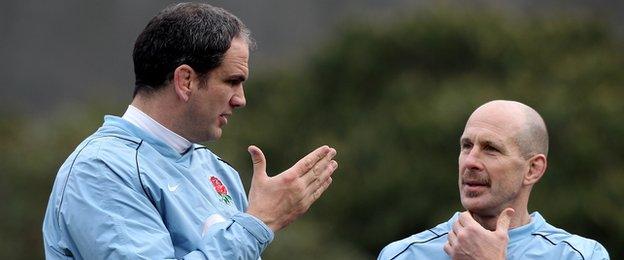
Pask worked with Martin Johnson while he captained England to the World Cup in 2003, and when he was head coach between 2008 and 2011
Pask first joined the England setup in 1997 for their tour to Argentina just as the game was in the early stages of professionalism.
At that time he was still combining his role with Northampton Saints and England, and the now full-time Rugby Football Union employee says one huge change in training techniques has been the use of technology.
"We used to work with (former British and Irish Lions coach) Ian McGeehan back in the day," he said.
"Ian knew the game inside out and I think he had a good grasp of what players needed in terms of how far they ran, how fast they ran, how many contacts they made - but it was all very intuitive.
"These days we have fantastic facilities where we can video every session we have. We have GPS units and accelerometers in the back of their shirts.
"From the video analysis we know exactly how many times you've dropped the ball or missed a tackle - it's taken a lot of the guesswork away."
Club v country
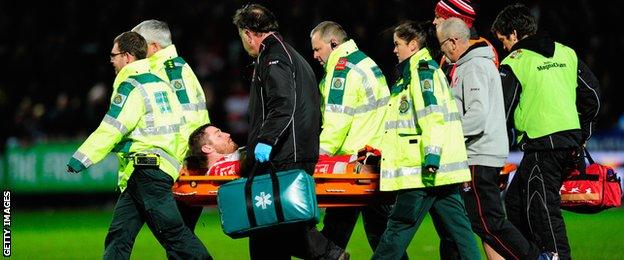
Ben Morgan broke his ankle in January, but is in the England World Cup squad
To ensure that injured international players can get the best possible treatment, both club and country need to work together with their recovery.
England and Gloucester number eight Ben Morgan is a perfect example of this after being named in Lancaster's World Cup squad despite a seven-month lay-off this year with a broken ankle.
"I'm really lucky with the physios I've had access to," said Morgan. "Bob Stewart (at Gloucester) and Pasky are British and Irish Lions physios, so you can't get much better than that.
"They always keep in contact with each other so everyone knows what I'm up to and what rehab I'm doing, which makes it so easy when I am transferring between club and country."
For more behind-the-scenes footage you can watch Inside Out on BBC One East at 19:30 BST on Monday, 14 September.
- Published14 September 2015
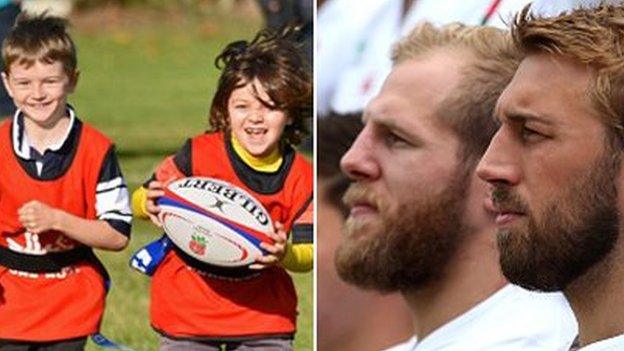
- Published15 September 2015
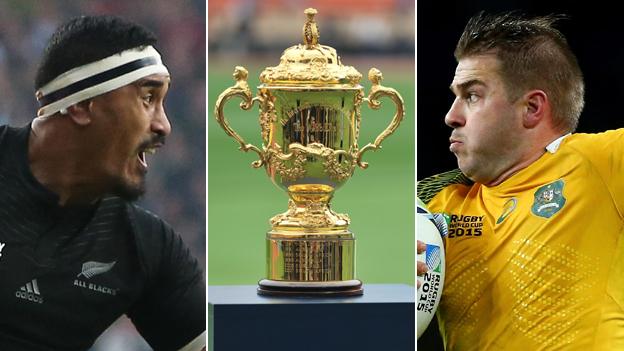
- Published14 September 2015
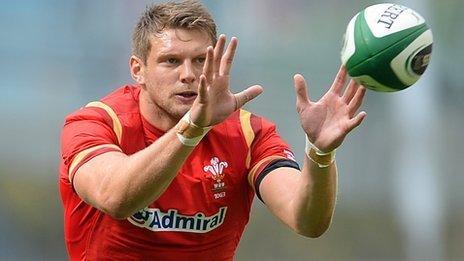
- Published14 September 2015
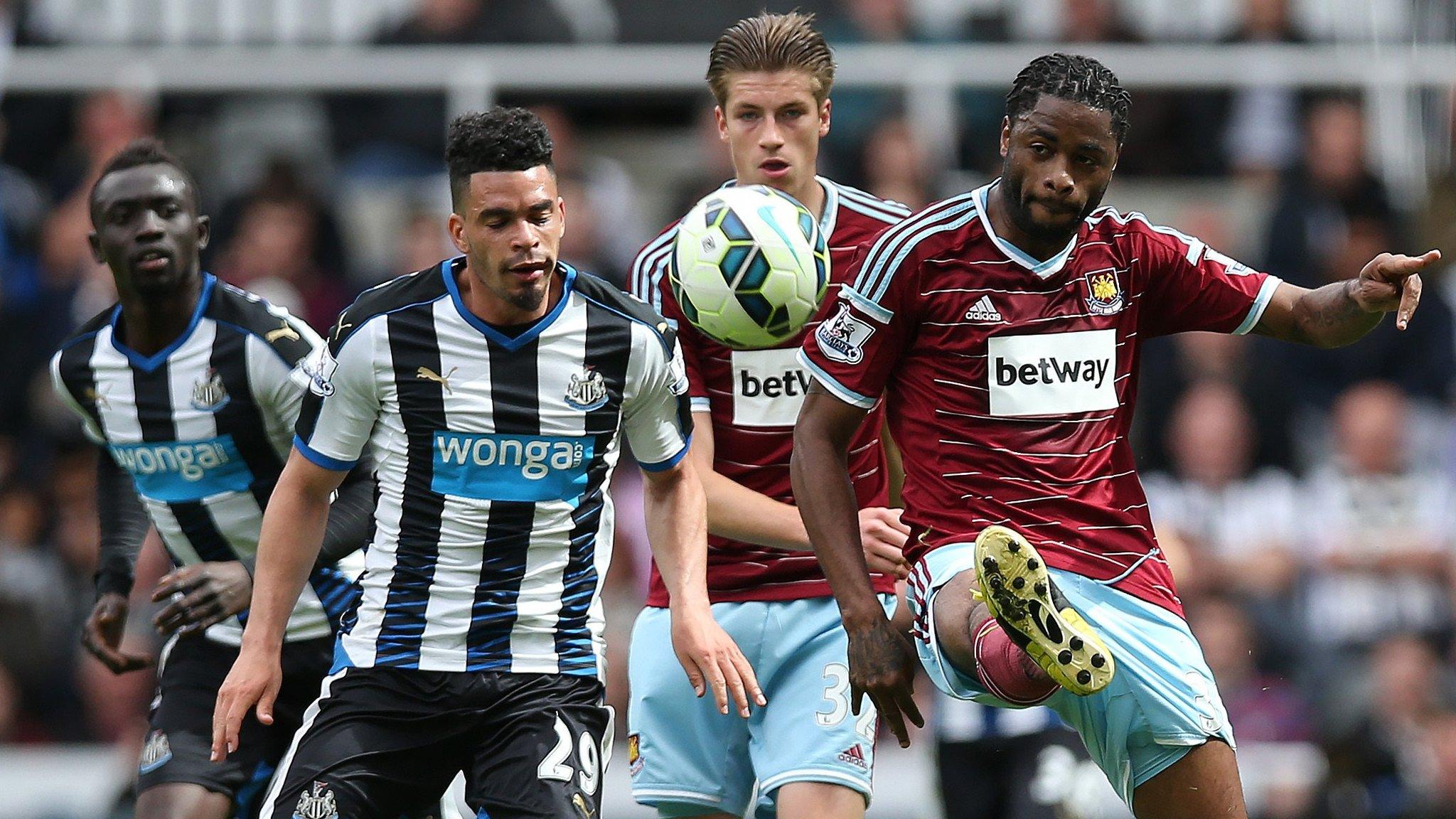
- Published14 September 2016

- Published3 February 2017

- Published15 February 2019
